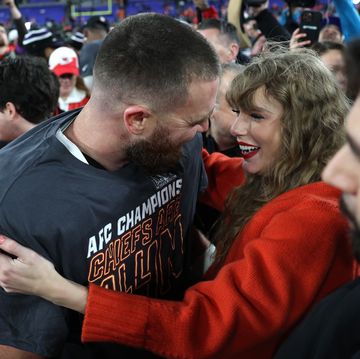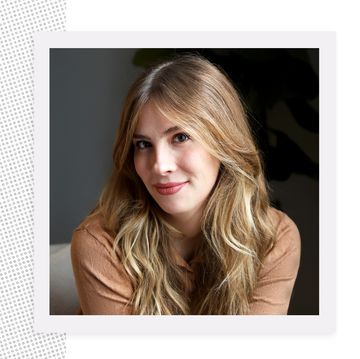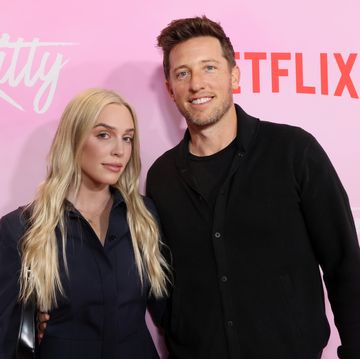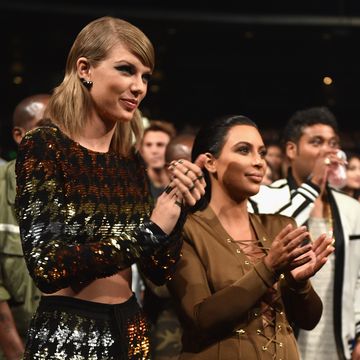Stars, they're just like us.
And not because they wear yoga pants to get their coffee or are sometimes snapped stooping and scooping for their beloved pet. But because, as it turns out, they're just as conflicted about success and ambition as the rest of us—and just as paralyzed by self-doubt. They're flawed too. And we know this because some of these stars are talking about it.
Consider Jennifer Lawrence's recent essay in Lena Dunham and Jenni Konner's Lenny newsletter. While much of the (enormous) attention the piece received focused on Lawrence calling out her male co-stars for making more than her, the essay itself was emphatically laced with the sort of apologetic tone so many women are accustomed to taking on when advocating for themselves. Says Lawrence before diving in: "I want to be honest and open and, fingers crossed, not piss anyone off."
And then, in explanation of why she didn't put up more of a fight in her negotiations: "But if I'm honest with myself, I would be lying if I didn't say there was an element of wanting to be liked that influenced my decision to close the deal without a real fight. I didn't want to seem 'difficult' or 'spoiled'…This could be a young-person thing. It could be a personality thing. I'm sure it's both. But this is an element of my personality that I've been working against for years, and based on the statistics, I don't think I'm the only woman with this issue. Are we socially conditioned to behave this way? We've only been able to vote for what, 90 years?…Could there still be a lingering habit of trying to express our opinions in a certain way that doesn't 'offend' or 'scare' men?"
The answer, as you likely know, is yes. In Lean In, Sheryl Sandberg talks about the "likability penalty" women suffer in the workplace, and there is new research that shows women are taken less seriously when they show anger. We are excellent at advocating for others, but less great when it comes to advocating for ourselves. But the difference here is Jennifer Lawrence publicly admitting it. These sorts of conversations—How do I negotiate without seeming difficult? How do I get angry without offending?—often happen behind the scenes, and only in conversations with other women. It's only recently, as more women butt their heads against glass ceilings, or corporate bathroom doors, or into an increasing amount of statistics that show how we are punished in innumerable ways for being powerful, that we are beginning to see them in public. Still, it's a revelation to hear someone as successful as Lawrence cop to suffering from the same self doubt, and the same tendency to blame herself.
She is not alone.
Take Amy Schumer's speech at ELLE's 22nd annual Women in Hollywood Awards this week. Comedians often make a living mocking themselves. Schumer's comments, though, were clearly not part of a routine.
"Why is Hollywood playing this big trick on me? When are they going to realize that I'm disgusting and that I have no right to be in a movie and that I should be doing the Funny Bone and begging for half off wings, which I'd been doing for 10 years, happily? And I was just ready for this big backlash, bracing myself. And it never happened."
Not that long ago it would have been unheard of for a successful Hollywood starlet to admit to such insecurities. It would have likely been career suicide. For most of Hollywood's history we've preferred our stars to live in the firmament, to be, like Beyonce, ***flawless.
Now their very reality-based admissions—and let's include Lena Dunham in here as well who, with her hit show, book, and new newsletter is chipping away at the idea that being perfect and looking perfect is some sort of prerequisite for success—are blazing a path of acceptance for a whole slew of women, powerful and otherwise, who have found themselves in exactly the same positions. And, importantly, are just going for it anyway.
Being able to say out loud, I feel scared, or insecure, or like a total imposter, perhaps grants a kind of permission to keep forging ahead in spite of all the doubt. As Dunham told ELLE earlier this year, "I've been in a lucky situation where I came into this job being myself. There was already a certain amount of built-in disdain for what I do. So I'm free." And in the video accompanying her November cover story, Schumer said, of writing the episode "12 Angry Men Inside Amy Schumer," "Writing so many insults about myself, I started to lose it, I was like, Should I keep doing this? Is this bad for me? But I was like, No, I'm going to push through, and then it became really liberating."
Because that's really the point here. While we'd all prefer to live in a world where a powerful woman doesn't have to turn herself into a pretzel of self doubt and recrimination to move ahead, we're not there yet; as Lawrence notes in her essay, we're still in the relatively early days of women wielding their own power. But knowing we are not alone in these doubts? And then seeing powerful women—Schumer not only has her own television show and co-wrote a movie, she recently negotiated a new a book deal for upwards of $8 million—concede they too feel unworthy, but are here to stay even so. That makes it that much easier for all of us to say, loudly, us too—and we're not going anywhere either.














